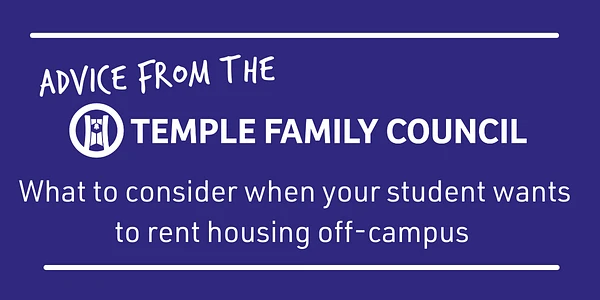Written by Jeanne Bishop, Temple Family Council Member
Temple students who pay their tuition and housing deposits by the deadline are generally guaranteed on-campus housing in their first year. After their first year, though, students often seek housing off-campus. Many choose to join with other students to share a house or apartment—some going through the process of finding and renting a place for the very first time in their lives. It’s a big step, one that involves communication and coordination with not only the group of students who will live together, but their parents or other caregivers as well.
My Temple student is a first-year this year, so he just went through the journey of finding and renting housing for next year with a group of his school friends. The experience was engaging and instructive and ultimately turned out really well! Here are some things we learned along the way.
Start early.
Rentals for Temple students tend to have move-in dates around early August. Six months in advance isn’t too soon to start looking.
Share contact information with the group of parents/caregivers and decide how you will communicate with one another and with your students during the search process.
My student planned to share a place with four other students, so we had five sets of parents. Some lived in the Philadelphia area or in nearby states, while I live in the Chicago suburbs. We all shared email addresses and phone numbers so we could text, email and Zoom to discuss our students’ housing search. We talked regularly from the beginning of their search through the signing of the rental agreement and payment of deposits.
Communicate early with the group about parameters for the housing search.
Parents have different comfort levels about where their student should live. Our group agreed that the housing could only be within the Temple Main Campus Patrol zone. Fortunately, Temple has a detailed Main Campus Patrol Map on its website so we could easily see, block by block, which rentals fell within the zone. Temple also has a wealth of off-campus housing information on its site and a the Best Nest Program that identifies housing that meets certain safety criteria, such as outdoor lighting and cameras. Temple even offers landlords stipends to provide certain safety features. Our students looked for and found a place that met the criteria and was well within the zone. My student even FaceTimed me as he walked the short distance from his residence hall to the rental to show me how close it is!
Once your students find a place, if possible, have at least one parent see it in person.
Our group was fortunate to have several parents who volunteered to go see the place in person and report back to the rest of us. It was reassuring to know the photos of the house we had seen accurately depicted what it actually looks like. An on-site visit also gave our parents the chance to speak to some of the current renters of the property to get their insights about the landlord, the neighborhood, etc.
Designate a person or persons to review and negotiate the rental contract.
We were also lucky to have a parent with real estate expertise in our group who looked over the rental contract and negotiated some changes favorable to our students. He noted that Philadelphia has a tenant’s rights ordinance, so the terms of the rental contract should comply with that law or be changed if not.
Communicate about getting in any required monetary deposits on time.
It’s essential that everyone in the group pays the required deposits by the deadline set by the property owner. These payments are often due on successive dates far in advance of the move-in date. Some landlords do not want to receive separate deposits or rental checks, so a good option is to have one parent pay the entire amount due and be reimbursed by the other renters or their family members. One parent has a great solution: he puts his daughter’s monthly rental on autopay and the other renters Venmo him their portion of the rent due.
Likewise, consider designating one student to be the point person to communicate with the landlord.
Often, landlords don’t want to deal with multiple renters individually. It’s often easier to have the roommates designate one of them to be the person who interacts with the landlord about things like repair requests, schedules, contractor visits, etc.
Remind your students to be good neighbors.
The Temple Good Neighbor initiative exists to encourage Temple students to proactively and intentionally make connections with their neighbors and, in doing so, establish basic guidelines to be responsible members of the community. Trash is an issue. Philadelphia has a trash pickup schedule which should be respected, and trash should only be left in containers that are secured to something so they won’t be stolen. Be mindful of noise.
Finally, remember that students can still participate in a Temple meal plan even when they live off-campus.
Some students keep a full meal plan to avoid having to shop for groceries, cook and clean up. Others choose to have a plan of 10 meals per week, to have breakfast and lunch on campus Monday through Friday, then make dinner on weeknights and weekends.
I loved getting to know the other parents through this joint project and seeing my students experience the real-world responsibility of finding and securing a great place to live while at Temple.
Interested in learning more or joining the Temple Family Council? Learn more here: Temple Family Council
Skip past news feed


